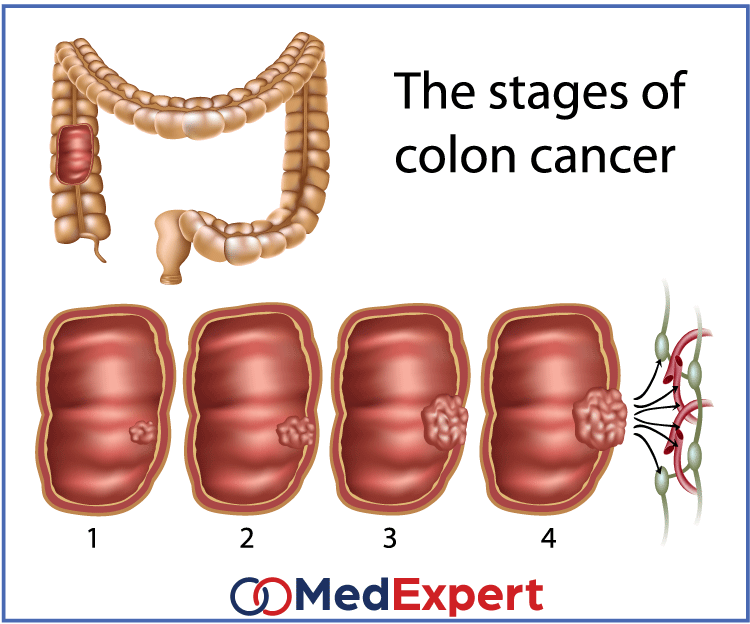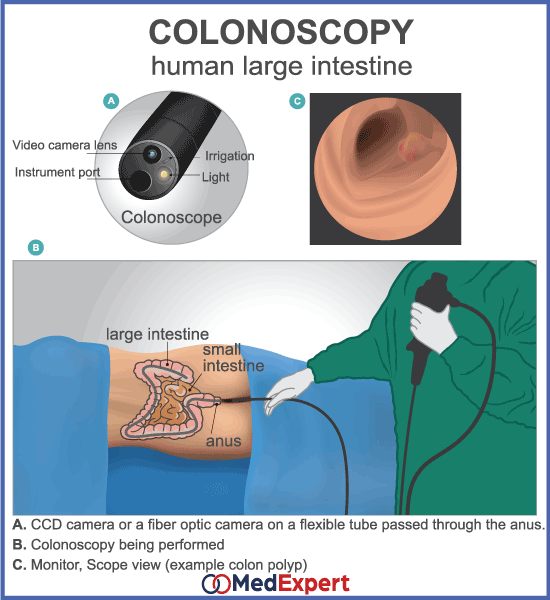COLON CANCER
When a malignant tumor develops in the large intestine, it means a person has colon cancer. If detected early, this type of cancer is preventable and highly curable. Colon cancer symptoms may be missing or similar to other common health problems. Colon cancer treatment depends on the stage of the cancer, its type and patient`s age, overall health. The most common options to treat colon cancer include surgery, chemotherapy, and radiation therapy. Colon cancer diagnosis requires several tests to be performed with the colonoscopy included. More detailed information about this condition, its symptoms, diagnostic services and colon cancer treatment is presented below.
The colon and the rectum are the final portions of the tube that extends from the mouth to the anus. When food enters the mouth, it is chewed and swallowed. It will then travel through the oesophagus and into the stomach. When it reaches the stomach, it is grounded into even smaller pieces before entering the small intestine in a carefully controlled manner. Final digestion of food and absorption of the nutrients contained in the food occurs in the small intestines. Food that is not digested and absorbed will enter your large intestine or colon and then finally the rectum.

WHAT DO LARGE INTESTINES DO?
The large intestine is about six feet long and it acts primarily as storage for waste. However, water, salts and some vitamins will also be further removed from food in here. The nutrients that are not digested such as fibre will be digested by colonic bacteria and some of the products of digestion are absorbed from the colon and into the body. An estimated of ten percent of the energy, derived from food comes from these products of bacterial digestion in the colon.
Remaining food that is not digested, dying cells from the intestines’ lining and a large number of bacteria are stored in the colon and then intermittently passed into the rectum. When they reach the rectum, a bowel movement is initiated to empty the colonic contents from the body.
WHAT IS COLON CANCER?
It is the cancer of the large intestines (colon) which is the lower part of your digestive system. Rectal cancer on the other hand is a cancer that occurs on the last several inches of the colon. Colon and rectal cancer are referred to as colorectal cancers.
Most colon cancers start out as small non-cancerous nodules called adenomatous polyps. However, these polyps may turn into colon cancer over time.
These polyps may be small and only show a few symptoms, if any. Doctors recommend regular tests to help in preventing colon cancer by identifying and removing these polyps before they turn into cancer.
COLON CANCER SYMPTOMS
The signs and symptoms of colon cancer are:
- Alteration of your bowel habits (includes diarrhoea or constipation or changes in the consistency of your stool that persist for more than four weeks)
- Blood in your stool or rectal bleeding
- Persistent discomfort in abdomen (cramps, gas or pain)
- A feeling that your bowels don’t empty completely
- Fatigue or weakness
- Unexplained weight loss
In the early stages of colon cancer, most people don’t experience any symptoms. When the symptoms do appear, they may vary depending on the size and location of the cancer in your colon.

COLON CANCER TREATMENT OPTIONS
The most suitable treatment for you will depend mainly on the stage of your cancer. The three main types of treatment are surgery, chemotherapy and radiation therapy.
Surgery for early-stage colon cancer
Your surgeon may recommend a minimally invasive approach to surgery if your cancer is very small.
- Colonoscopy:The removal of your cancer may be completed during a colonoscopy if your cancer is small, localized in a polyp and in the early stage.
- Endoscopic mucosal resection: The removal of larger polyps may require removing a small amount of the colon lining in this procedure.
- Minimally invasive surgery: Laparoscopic surgery may be used to remove polyps that couldn’t be removed during colonoscopy. Your surgeon will perform the surgery through a few incisions in the wall of your abdomen. Instruments with the camera will be inserted into your abdominal cavity to display your colon on a video monitor. Samples of your lymph nodes located nearby the cancer growth may also be taken for testing.
Surgery for invasive colon cancer
Your surgeon may recommend the following surgeries if your colon cancer has grown into or through your colon wall.
-
- Partial colectomy: A part of your colon that contains cancer along with a margin of normal tissue on either side of the tumor will be removed. The healthy portions of your colon and rectum will normally be reconnected successfully by your surgeon.
- Colostomy: You may need a colostomy when it is not possible to reconnect the healthy portions of your colon or rectum. An opening will be created in the wall of your abdomen from a portion of the remaining bowel for waste elimination into a special bag.
Colostomy is sometimes temporary. This is to allow your colon or rectum to heal after surgery. However, in some cases, colostomy may be a permanent solution.
- Lymph node removal: During a colon cancer surgery, the nearby lymph nodes are usually removed as well and sent to the lab for cancer studies.
Surgery for advanced cancer
If your overall health is poor and your cancer is in the advanced stages, an operation may be recommended by your surgeon to relieve a blockage of your colon or other conditions to improve your symptoms. This procedure is not done to cure your cancer. It is completed to relieve signs and symptoms such as pain and bleeding.
Your doctor may recommend surgery to remove cancerous lesions from your liver in specific cases if the cancer has spread only to the liver and your overall health is good. Chemotherapy may also be used before or after this type of surgery. This surgery may improve your prognosis.
Chemotherapy
Specific and very powerful drugs are used in chemotherapy to kill cancer cells. For colon cancer, chemotherapy is normally given after surgery if the cancer has spread to the lymph nodes. It helps to reduce the risk of cancer recurrence. Chemotherapy may also be used before surgery to shrink the size of the growth before an operation. It can also help to ease the symptoms if the cancer has spread to other parts of the body.
For rectal cancer patients, chemotherapy is normally combined with radiation therapy and is used before and after surgery.
Radiation therapy
Powerful energy sources such as X-rays are used to kill cancer cells that may have remained after surgery. It can also be used to shrink large tumors before surgery for easy removal or to relieve symptoms of colon cancer and rectal cancer
This therapy is not normally used in early-stage colon cancer. However, it is a routine part of treating rectal cancer especially if the cancer has gone through the wall of the rectum or spread to nearby lymph nodes. To make the surgery easier and to reduce the chance that an ostomy will be necessary, radiation therapy may be combined with chemotherapy. It may also be used to reduce the risk of cancer recurrence in the area.
Targeted drug therapy
This therapy uses drugs to target specific defects that allow cancer cells to grow; SUCH DRUGS are available to patients with advanced colon cancer. These drugs are:
- Bevacizumab (Avastin)
- Cetuximab (Erbitux)
- Panitumumab (Vectibix)
- Ramucirumab (Cyramza)
- Regorafenib (Stivarga)
- Ziv-aflibercept (Zaltrap)
This treatment can be combined with chemotherapy or given alone. This is typically held back for patients with advanced colon cancer.
Targeted drugs may help some people while they may be unbeneficial to other people. Researchers are working to find out who is most likely to benefit from this therapy. Until then, when deciding whether or not to use this therapy, doctors carefully weigh the limited benefits of this therapy against the risk of side effects and the expensive cost.
COLON CANCER DIAGNOSIS
-
- History taking and physical examination:Your doctor will ask you questions about your overall health, symptoms you have and family medical history, as those, who have a family history of colon cancers are assumed to be more predisposed to have the same condition. Then your doctor will perform a physical examination of your body to look for any visible symptoms.
- Blood tests:There are no blood tests that can tell if you have colon cancer. However, your doctor may test your blood to get the idea about your overall health such as kidney and liver functions.
Your blood may also be tested for a chemical that is sometimes produced by colon cancer (carcinoembryonic antigen or CEA). The level of CEA is you blood is tracked over time to help your doctor understand your prognosis and whether your cancer is responding to treatment.
- Colonoscopy:This is a test that allows your doctor to take a look at the inner lining of your large intestine (rectum and colon). A thin, flexible tube called a colonoscope is then used to look in the colon. This is the most sensitive test for colorectal polyps and cancer. Your doctor may remove any polyps found immediately or take tissue samples for analysis.



